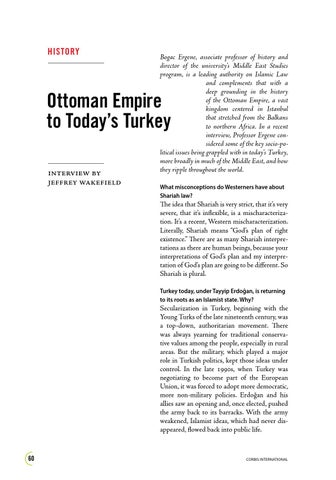history
Bogac Ergene, associate professor of history and director of the university’s Middle East Studies program, is a leading authority on Islamic Law and complements that with a deep grounding in the history of the Ottoman Empire, a vast kingdom centered in Istanbul that stretched from the Balkans to northern Africa. In a recent interview, Professor Ergene considered some of the key socio-political issues being grappled with in today’s Turkey, more broadly in much of the Middle East, and how they ripple throughout the world.
Ottoman Empire to Today’s Turkey Interview by Jeffrey Wakefield
What misconceptions do Westerners have about Shariah law?
The idea that Shariah is very strict, that it’s very severe, that it’s inflexible, is a mischaracterization. It’s a recent, Western mischaracterization. Literally, Shariah means “God’s plan of right existence.” There are as many Shariah interpretations as there are human beings, because your interpretations of God’s plan and my interpretation of God’s plan are going to be different. So Shariah is plural. Turkey today, under Tayyip Erdoğan, is returning to its roots as an Islamist state. Why?
Secularization in Turkey, beginning with the Young Turks of the late nineteenth century, was a top-down, authoritarian movement. There was always yearning for traditional conservative values among the people, especially in rural areas. But the military, which played a major role in Turkish politics, kept those ideas under control. In the late 1990s, when Turkey was negotiating to become part of the European Union, it was forced to adopt more democratic, more non-military policies. Erdoğan and his allies saw an opening and, once elected, pushed the army back to its barracks. With the army weakened, Islamist ideas, which had never disappeared, flowed back into public life.
60
corbis international
